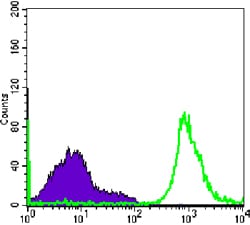

| WB | 咨询技术 | Human,Mouse,Rat |
| IF | 咨询技术 | Human,Mouse,Rat |
| IHC | 咨询技术 | Human,Mouse,Rat |
| ICC | 1/200 - 1/1000 | Human,Mouse,Rat |
| FCM | 1/200 - 1/400 | Human,Mouse,Rat |
| Elisa | 1/10000 | Human,Mouse,Rat |
| Aliases | B4; MGC12802 |
| Entrez GeneID | 930 |
| clone | 2E2 |
| WB Predicted band size | 61kDa |
| Host/Isotype | Mouse IgG2b |
| Antibody Type | Primary antibody |
| Storage | Store at 4°C short term. Aliquot and store at -20°C long term. Avoid freeze/thaw cycles. |
| Species Reactivity | Human |
| Immunogen | Purified recombinant fragment of human CD19 expressed in E. Coli. |
| Formulation | Ascitic fluid containing 0.03% sodium azide. |
+ +
以下是关于CD19抗体的3篇代表性文献及其摘要概括:
---
1. **文献名称**:*Chimeric Antigen Receptor T Cells for Sustained Remissions in Leukemia*
**作者**:Maude SL, et al.
**摘要**:该研究报道了CD19靶向的CAR-T细胞疗法在复发/难治性急性淋巴细胞白血病(ALL)中的突破性疗效,显示高比例患者实现完全缓解,奠定CAR-T治疗B细胞恶性肿瘤的临床基础。
2. **文献名称**:*Targeting CD19 with Bliantumumab Leads to Responses in Relapsed/Refractory B-Cell ALL*
**作者**:Topp MS, et al.
**摘要**:首次证明双特异性抗体Blinatumomab(同时靶向CD19和CD3)可激活T细胞杀伤CD19+白血病细胞,显著提高复发/难治性ALL患者的生存率,推动双抗技术的临床应用。
3. **文献名称**:*CD19: A Biomarker and Therapeutic Target for B Cell Diseases*
**作者**:Wang K, et al.
**摘要**:综述CD19在B细胞发育及肿瘤中的作用机制,总结基于CD19的单抗、ADC(抗体药物偶联物)和CAR-T疗法的研究进展,并讨论耐药性及联合治疗策略。
---
以上文献涵盖CAR-T、双抗及机制综述,均为领域内高影响力研究。如需更多方向(如耐药机制或新药开发),可进一步补充。
CD19 is a transmembrane protein predominantly expressed on B cells, serving as a critical regulator of B cell receptor signaling and immune activation. Its restricted expression pattern—spanning from early B cell development to differentiation into plasma cells—makes it an attractive therapeutic target for B cell malignancies, including acute lymphoblastic leukemia (ALL), chronic lymphocytic leukemia (CLL), and non-Hodgkin lymphomas.
CD19-targeted therapies emerged in the 1980s with murine monoclonal antibodies (mAbs), but clinical utility was limited due to immunogenicity and modest efficacy. Advances in antibody engineering led to humanized or fully human anti-CD19 mAbs, reducing immune rejection. A breakthrough came with chimeric antigen receptor (CAR) T-cell therapy, where autologous T cells are engineered to express CD19-specific CARs. FDA approvals for CD19 CAR-T products (e.g., tisagenlecleucel, axicabtagene ciloleucel) revolutionized treatment for refractory B cell cancers, achieving durable remissions in previously untreatable patients.
Bispecific antibodies, such as blinatumomab (CD19×CD3), redirect T cells to lyse CD19+ B cells, offering an off-the-shelf alternative to CAR-T. Despite success, challenges persist: antigen escape (loss of CD19 expression), cytokine release syndrome, and neurotoxicity. Ongoing research focuses on combination therapies, next-gen CAR designs, and expanding applications to autoimmune diseases (e.g., lupus, multiple sclerosis) where pathogenic B cells drive pathology. CD19 remains a cornerstone in immunotherapy, balancing promise with biological complexity.
×